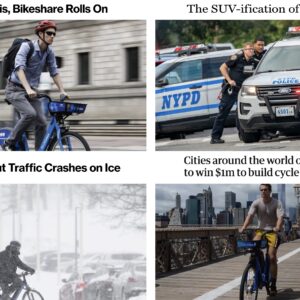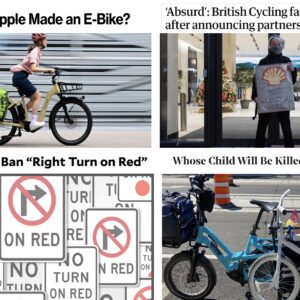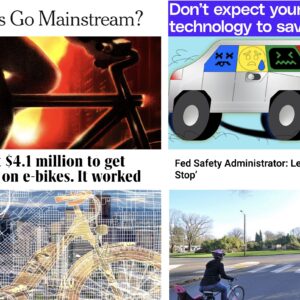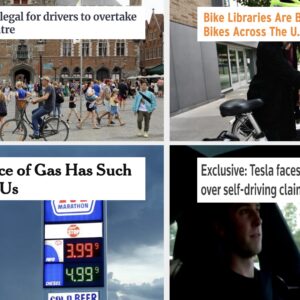In the U.S., we work 2 extra hours per day on average just to pay for our cars.
Here’s the news that caught our eye this week:
– Bike sharing has launched in Toronto, with much fanfare. As Canada’s government switches parties, support for the Bixi system isn’t falling along party lines. A reporter tries out the system and kind of likes it. Finally, a story about how the bikes are maintained by participants in a job training program.
– A look at the U.S.’s crumbling transportation infrastructure and its costs, in sobering comparison with that of Europe.
– Little girls riding little cargo bikes — it just doesn’t get cuter than this, folks.
– A group of veterans pedaled away from the White House after a presidential send-off on a cross-country ride to raise money and awareness for wounded soldiers.
– Delaware is the latest state to enact a three foot passing law.
– In Wisconsin, $5 million in bicycle funding has been cut from the state’s budget.
– In the U.S. we work 2 extra hours per day on average just to pay for our cars.
– A trip down U.S. 40 spurs a meditation on how highways have changed the midwest, for good and ill.
– A Connecticut police chief calls out the state transportation department for building roads that kill people.
– When you have a well-connected street grid, the costs of emergency management are considerably lower than when the fire truck has to go all the way around to get to your cul de sac.
– In Alhambra, California, activists engage residents in the urban planning process by building model communities out of recycled materials.
– A Dutch delegation shows planners in Miami how to build separated cycle tracks. Meanwhile, a Washington Post columnist visits the Netherlands and dreams of a calmer bike commute in DC.
– In San Francisco, commuters are eschewing technical bike garb and simply wearing their work clothes for the ride in.
– In Los Angeles, one man’s ode to his electric bike
– A reporter on a quest to learn to ride a bike as an adult discovers the secret: Relax!
– How riding the bus will make your kid smarter.
– Some tips from bicycle travelers on how to be a bike-friendly business without spending a cent.
– In Berkeley, ambitious knitters bomb the library’s bike racks.
– Video of the week: An NYC firefighter talks about her bike commute:
My NYC Biking Story: Sarinya Srisakul from Streetfilms on Vimeo.







Thanks for reading.
BikePortland has served this community with independent community journalism since 2005. We rely on subscriptions from readers like you to survive. Your financial support is vital in keeping this valuable resource alive and well.
Please subscribe today to strengthen and expand our work.
“Commuting is not racing. Take your time and enjoy!”
I find this kind of speedism irritating. The idea that cyclists should ride slow is, IMO, rooted in car-centric thinking that does not view bicycles as utilitarian transportation tools. Do we admonish motorists or public transportation users to “take their time and enjoy”.
“Some people prefer clothing made of natural fibers, like wool or cotton, because of their breathability.”
When I started commuting I wore conventional clothing. Now, I thank the bloody stars for lycra and breathable rainware.
“The final touch: She was *pushing* a bike with…”
Bike accessory.
“Torres’ advice to first-time bike commuters puts it most succinctly: “Don’t think about it too much.”
No comment.
You are already the ‘norm’. This isn’t ‘speedism’ it’s encouraging people who are intimidated by the ‘norm’ to bike by stating you needn’t be the norm to do so.
Communing isn’t racing.
It’s not a race…it’s getting from point a to b. If imagining you are racing other commuters makes you happy so be it. I do it sometimes but I am pretty darn sure the person I am ‘racing” has no idea… What is that, Cat 6 I think?
It not that cyclists SHOULD ride slow, but that you CAN, that speeding along isn’t required.
There is room for cyclists of all speeds. No one is saying those of us who like to ride fast, or those of you who like Lycra are bad or wrong. But to be a bike commuter you don’t needto be fast or kitted out.
There is nothing wrong with letting people know that they can still commute and ride slower, be chic or whatever pleases their fancy. That they can be older, less fit, have kids, be younger, less abled whatever…that you don;t need a shower at work, to haul your work clothes with you etc if you plan ahead.
I also push my bike… when I am on the phone or parking it, negotiating a sidewalk finding a place mid block..whatever sometimes you push your bike. My bike has pink fenders and handlebar tape. Not an accessory by any stretch since I am carfree and haul loads of stuff with that workhorse. It can still be a cute workhorse. I also haul stuff (and haul ass) in a skirt instead of Lycra.
Amen!
“But to be a bike commuter you don’t needto be…kitted out.”
Until it rains.
“It’s encouraging people who are intimidated by the ‘norm’ to bike”
The people who need to be encouraged are not the ones speeding or racing.
“My bike has pink fenders and handlebar tape.”
I am pro-cute and pro-pink.
I agree that rain gear is a plus, but I see an awful lot of people out in the ‘warmer’ winter months without it. More power to them! Wet denim doe not appeal to me but I see a lot of folks in jeans in the rain.
I finally got booties and I have to say, I am sold. Rain gear does fit over my regular clothes…it’s less bike kit to me, a more Oregon kit. I mean, I wear a rain jacket when I am out walking too. =)
And yes,we are in agreement on your other two replies.
The San Francisco Chronicle story refers to a category of cyclists that don’t like to sweat, and have figured out they can ride a bike for commuting, without having to sweat. It’s entirely possible to do this, by letting the bike be essentially, a more efficient means of walking. Just sit there, upright, gently cranking the pedals, not exerting any more effort than you would walking.
Riding this way, sure…a person could probably can avoid sweating their clothes up so much they have to shower and change. If that’s what it takes to persuade more types of people to ride, definitely encourage them to try riding this way.
Going fast on a bike is no problem as long as it isn’t done in close proximity to people that are choosing to or obliged to go slow because of close quarters or congestion.
Also glad to see the article about former Milwaukee Wisconsin Mayor’s efforts through the group he now heads up, The Congress for the New Urbanism, to point out a key flaw in the downside of cul-de-sacs. Cul-de-sacs aren’t bad in every situation, but it’s very unfortunate that cul-de-sacs have been allowed to over-ride sensible planning for critically needed through routes.
The New Haven post is interesting, because it lends support to a point Jonathan and others have made about Portland: the dangerous streets are overwhelmingly the state DOT-controlled streets.